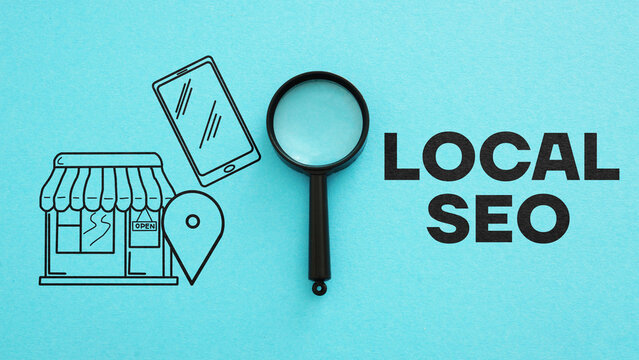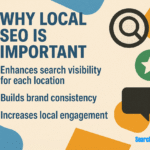If you run a business that works in more than one city, you need to be seen in more than one city, online too. Many people search for things using city names. For example, they don’t just search “plumber.” They search for “plumber in Arlington.” That extra word is Arlington, and it matters a lot.
Search engines like Google look for signs that you work in that area. If your website doesn’t have a page for Arlington, Google might not show it to people there. That means you could lose customers who are right near you, just because your website didn’t say the right thing.
That’s where location pages help. A location page is a part of your website made just for one area you serve. It concerns that specific city, what you provide there, and why the town itself should trust you.
Let us say you serve five different cities, but all you have is one main service page. You thereby narrow your online business growth and make it harder for people to find you. These pages don’t take very long to create, but they really do make a huge difference in who your business is visible to.
Now, let’s look at exactly why your business needs a location page for every area you serve.
Location Pages Help You Show Up Where Customers Are Searching
Most people don’t search for services using general terms anymore. They add city names to what they type. For example:
- “Lawn care in Anaheim”
- “Best baker in Queens”
- “Affordable roof repair near Palo Alto”
Google tries to show results that match those locations. But if your website doesn’t have pages about those places, you might not show up at all.
Why It Matters
Location pages use local words. That makes Google understand where you work. It’s like giving Google a map. Without that, your business may feel “lost” online.
Working with a local SEO agency can help businesses show up better in local searches because they build strong location pages with the right keywords, page structure, and content that search engines trust—helping your website become more visible to nearby customers who are ready to buy.
A study by BrightLocal (2024) found that 78% of local mobile searches lead to a purchase within 24 hours.
This proves that Google gives more attention to websites that talk about specific places, not just general areas.
What to Put on a Location Page
- The city or town name in the title
- A quick intro about your services there
- Local landmarks or neighborhoods you serve
- Reviews from people in that city
- A contact button with the right area code
It’s not about stuffing names everywhere. It’s about being helpful and clear, so customers know you’re local to them.
They Let You Customize Content for Each Area’s Unique Needs
Every city is different. The Miami population is concerned with some issues, while Chicago residents find others on their mind. Even rural towns each have differing demands. A local page allows you to speak to each of these regions.
For example, say you run a janitorial service. One city may be struggling with pet hair; the other may want green cleaning. What is concerning “one size fits all” content is that people want to feel that you comprehend their city.
How This Builds Trust
When you use city names and talk about local needs, people feel seen. They know you’re not just copying content; you’re working in their area.
Example: A customer from Denver sees, “We’ve cleaned over 1,000 homes in Denver neighborhoods like Capitol Hill, Cherry Creek, and Park Hill.” That feels real. That builds trust.
Working with a local SEO agency gives you the tools to create pages that match each area’s style, tone, and customer needs, so instead of being generic, your content speaks directly to the person searching, which makes them more likely to choose you.
Customize These for Each Page
- Photos from actual jobs in the area.
- City-specific services or seasonal needs.
- Quotes from happy local customers.
- Links to local news or events, if relevant.
A custom page tells the person reading, “Yes, we really work here. We know what you need.”
Location Pages Build Trust with Locals and Increase Conversion Rates
Let’s be real: people trust businesses that feel close to home. Seeing their city name on your website makes them more likely to click, call, or visit. That’s what a location page does—it creates a feeling of closeness and trust.
Imagine two websites:
- One says, “We offer cleaning services.”
- The other says, “We’ve helped over 200 families in Pasadena with weekly home cleaning.”
Which one feels more real to someone in Pasadena? The second one, of course.
Why Trust Matters
When someone trusts you, they are more likely to:
- Book a service
- Leave a good review
- Tell their friends
A great location page helps you win people over even before they call you.
What Builds That Trust?
- Local testimonials: “Maria from Brooklyn says…”
- Your team’s photo with a local background
- Mention of landmarks or neighborhoods you’ve worked in
Work with a local SEO agency. They’ll guide you in creating trust-building elements like local reviews, contact forms with city-specific numbers, and clean page layouts, ensuring each visitor feels your business understands and belongs in their area.
Bonus: Google Notices, Too
Google likes it when people stay on your site. When a location page keeps someone reading, that’s a signal to Google. It says, “This is a good page.” And better pages rank higher.
Without Them, You’re Invisible in Nearby Search Results
This might sound a bit harsh, but if you don’t have location pages, your website is nearly invisible to people in cities you serve, even if you do great work there. Google doesn’t guess. It reads your website and decides what to show based on what it finds.
The Problem
Say you serve 10 cities, but your website only talks about one. When someone in another city searches, they’ll see your competitor instead—because that person does have a page for that city.
A good local SEO agency helps fix this by setting up separate pages for each place you serve and making sure each page follows best practices like having local keywords, real service info, and structured formatting—so search engines trust your site more and show it to more people.
What Happens Without Location Pages
- You miss traffic from nearby cities
- Your competitors get more calls than you
- Google doesn’t know how far you reach
- People may think you don’t work in their city
Let’s Compare
|
Website Type |
Visibility in Search |
|
One general page |
Low |
|
10 detailed location pages |
High |
When Google reads a location page, it gets a strong signal: “This business works in this town.” That’s what gets you found. And that’s what gets you leads.
They’re the Foundation for Scalable Local SEO Strategy
Think big—but build small. Location pages are great for growth. They make it easier to add new cities over time. If you want to grow into new areas, location pages help you get ready before you even open shop there.
What Makes It Scalable?
- Each page follows a template.
- You just swap in the new city’s info.
- You can link to it from your homepage, blog, or Google Business Profile.
This gives you a strong base. Later, when you add a new location, you don’t need to start from scratch. You already have the plan.
Working with a local SEO agency ensures your location pages use a structure that can grow as your business expands, helping you cover new territories, support your Google listings, and build backlinks—all while staying organized and clear to both users and search engines.
Pro Tips
- Use URLs like /locations/mesa/ or /areas-we-serve/san-diego/
- Keep content clean—don’t copy-paste
- Track each page’s performance to see what works
Why It Matters Long-Term
As you grow, your SEO should grow with you. But if you don’t build that system early, things get messy. You’ll have random pages, poor search results, and a confused audience.
A strong local structure now makes your future expansion easier, faster, and more profitable.
Image Source: Search Engine Land
Conclusion: Every City You Serve Deserves a Page
Your business is doing good work in many places. But your website might not be showing that clearly. Every city, town, or neighborhood you work in deserves its own page that tells people, “We’re here. We serve you.”
These pages help with more than just SEO. They build trust, show you care, and make your business feel real and local to the person reading them.
Even if you’re a small business, location pages are worth it. You don’t need dozens. Start with just a few, focus on making them useful, and grow from there.
Partnering with a local SEO agency helps you build smart, simple, and high-quality location pages that are built to rank, get clicks, and make real connections—so you aren’t just showing up online; you’re winning locally with every search in every neighborhood you serve.
Your customers are searching for you in their city. Make sure your website answers back with a page that says, “Yes, we’re right here with you.”
- Why Your Business Needs Location Pages for Each Area You Serve
- Create dedicated location pages for every area you serve to boost local SEO, improve visibility, and attract more nearby customers to your business
- Location Pages for Each Area
Related posts:
 Crystal Pro Max + 10000 Box of 10: Long-Lasting Flavour from a Trusted Vape Store in UK
Crystal Pro Max + 10000 Box of 10: Long-Lasting Flavour from a Trusted Vape Store in UK
 How to Style Your XPLR Merch? Master the Look with Confidence and Edge
How to Style Your XPLR Merch? Master the Look with Confidence and Edge
 Online Editable Wedding Invitation Cards Free Download – Make Your Wedding Invite Truly Yours
Online Editable Wedding Invitation Cards Free Download – Make Your Wedding Invite Truly Yours
 Best Junior Colleges for CEC | Shamshabad | Hyderabad – Accomplish Academy
Best Junior Colleges for CEC | Shamshabad | Hyderabad – Accomplish Academy
 Data-driven SEO strategies using predictive AI AbdulHadi Blog
Data-driven SEO strategies using predictive AI AbdulHadi Blog
 Experienced PIP Attorney – Protecting Your Rights with Mass Pip
Experienced PIP Attorney – Protecting Your Rights with Mass Pip
 Top Recommended Materials for Long-Lasting Flat Roof Systems
Top Recommended Materials for Long-Lasting Flat Roof Systems
 Syna World: Redefining Streetwear with the Iconic Syna World Tracksuit
Syna World: Redefining Streetwear with the Iconic Syna World Tracksuit









